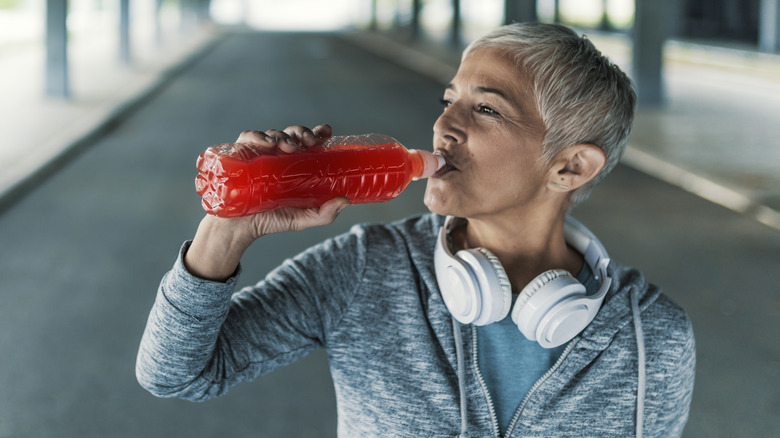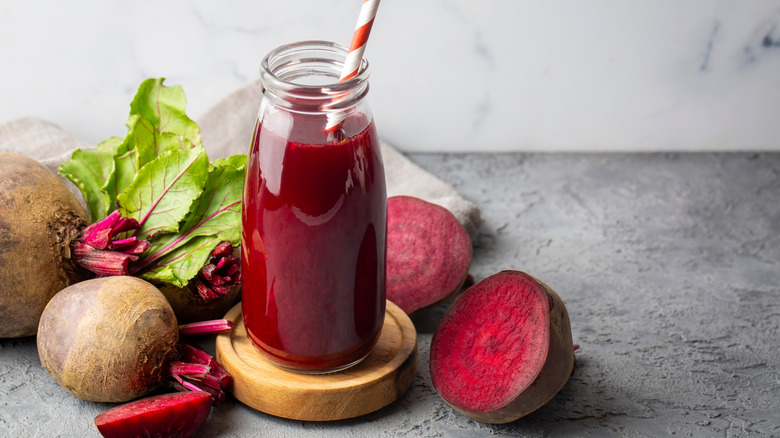The Underrated Juice That Can Lower High Blood Pressure And Cholesterol At The Same Time
When it comes to juices, orange juice is popular on many breakfast tables. Orange juice has more than a full day's supply of vitamin C while also providing plenty of potassium, thiamin, and folate. Kids also love the sweet taste of apple juice, even if it lacks the nutrients of orange juice. You might also opt for tropical juices such as mango or pineapple, or maybe you prefer cranberry juice to maintain urinary health.
One type of juice you don't often find on grocery store shelves, however, is beetroot juice — although sometimes you can find cold-pressed beetroot juice in the produce aisle. Or you may be able to order a glass of fresh beetroot juice at your gym's juice bar since athletes have been drinking beetroot juice for years to power and recover from their performances.
Beetroot juice has nitrates that convert to nitric oxide to improve blood flow. For this same reason, beetroot juice could also help reduce your blood pressure. What you might not know, however, is that beetroot juice could also lower your cholesterol.
How beetroot juice works to lower blood pressure
Beets, spinach, celery, and radishes are high in nitrates, which are converted into nitrites by the bacteria in your mouth. The acids in your stomach convert some of these nitrites into nitric oxide, and some of the nitrites enter your bloodstream. Nitric oxide helps to widen your blood vessels and lower your blood pressure. A 2018 review in Biomolecules combined the results of 11 controlled trials involving beetroot juice's effect on blood pressure. Beetroot juice can reduce blood pressure for up to three hours after consumption, and some studies found reductions in blood pressure for up to 24 hours. Beetroot juice was effective in healthy people as well as people with high blood pressure.
Beetroot juice has also been shown to improve the function of your blood vessels. In a 2019 study in Nutrients, healthy older adults (average age of 63) drank either 70 milliliters (just under ¼ cup) of beetroot juice or a placebo every day for two weeks. When drinking the beetroot juice, their systolic blood pressure dropped by 6 millimeters of mercury and diastolic lowered by 4 millimeters of mercury. They also saw a 1.5% improvement in large blood vessel function.
Beetroot juice may also reduce cholesterol
Foods rich in fiber are known to help lower your LDL cholesterol, and healthy fats from avocado, olive oil, and fatty fish can raise your HDL cholesterol. Beetroot juice might also be helpful in keeping your cholesterol levels in check, although the research is somewhat limited. A 2015 study in the Journal of Pharmacy and Nutrition Sciences had healthy and physically active infantry soldiers drink 400 milliliters of beetroot juice (about 13 ounces) twice a day for 15 days. As a result, their HDL cholesterol increased by more than 7 points on average and their LDL dropped by more than 10 points. The researchers believed that the cholesterol-improving power of beetroot juice might be attributed to the phytochemical betalain.
Another study looked at whether beetroot juice could reduce cholesterol in people with high blood pressure. A 2017 study in the Irish Journal of Medical Science found that drinking beetroot juice every day for two weeks lowered LDL cholesterol by almost 14 points and lowered blood pressure. However, this effect was only seen in people with uncontrolled high blood pressure. Beetroot juice wasn't as effective for people with controlled high blood pressure. A 2022 meta-analysis in Current Problems in Cardiology determined that beetroot juice wasn't effective enough in reducing cholesterol.


